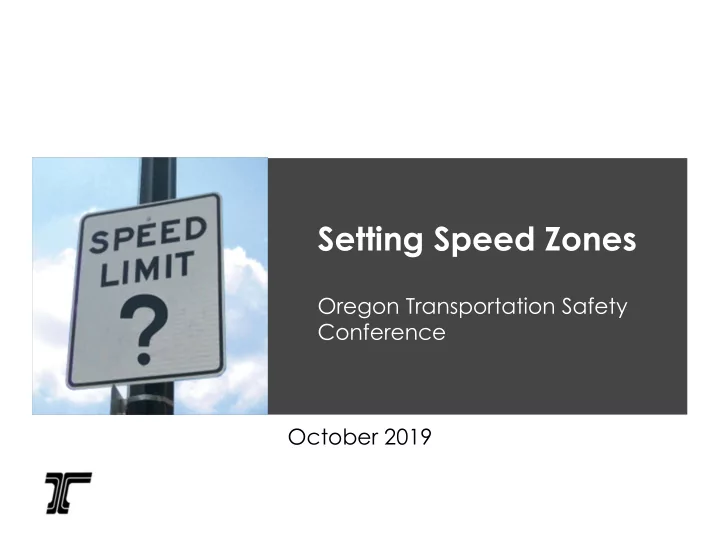

Setting Speed Zones Oregon Transportation Safety Conference October 2019
How are speeds set in Oregon? Some by state statute • 15 mph Alleys or Narrow residential roadways (less than 18’ wide) • 20 mph Business district, school zones and on some residential roads. • 25 mph Residential districts, public parks and ocean shores • 55 mph Rural highways (and not posted elsewhere) • 60 mph trucks on most interstates and some rural highways ( 65 mph on some interstates and rural highways) • 65 mph Passenger vehicles, light trucks on interstate highways ( 70 mph 2 on some Interstates)
How are Speeds set in Oregon? Some by Local Agencies Set Emergency and Local road authorities Temporary speed can set speeds on low zones volume local roads 3
How are Speeds set in Oregon? Some by Designating Speeds (the alternative to Statutory) Statutory Statutory 15 MPH 20 MPH 25 MPH 55 MPH 65 MPH 70 MPH Need Investigation to Determine *Designated may be any speed or if roadway does not meet statutory requirements
Designated Speeds Where statutory When the Requires speeds don’t fit statutory speed Engineering the road or the is greater than Investigation of land uses is safe or conditions reasonable 5
State Traffic- Investigation & Request Roadway Recommendation Engineer Action 6
Speed Zone Investigation Collected, compiled, analyzed: Roadside character Traffic mix & volume Crash data Roadway measurements Travel Speeds 7
Concurrence on Local Jurisdiction's Roadways State Traffic Roadway Engineer Reconsider Local Speed Zone Jurisdiction Concurs Order Concurs/or not Does not concur SZRP Makes Option to final decision take to SZRP
Speed Zone Review Panel Representatives from City, County, Safety, Enforcement and ODOT Hears disputed speed zone cases Makes final decision on speed zones 9
Investigate “the middle” Local options Minimize Speed Variance Statewide consistency Objective process 10
New methodology - Our task is to set Reasonable and Safe Speeds Travel Speed Travel Speed Speed setting directly impacts directly impacts practices are Safety mobility (time of often political travel) 11
Where were we in the past? Roads were built to Mobility was the highest move motor vehicles value, increasing travel more quickly speeds to get there faster 12
Where are we going in the future? We have many other Local road authorities are users besides motor desiring to slow speeds to vehicles now meet community values 13
Set Context based on Land Use 14
Set Speeds for Context and Function 15
Proposed Target Posted Speeds Context > Urban Urban Mix Suburban Suburban Core/CBD Commercial Fringe and Roadway Residential Class Arterial 20 ‐ 25 25 ‐ 30 30 ‐ 35 35 ‐ 45 Low Med Low Med High High Collector 20 ‐ 25 25 ‐ 30 25 ‐ 35 30 ‐ 40 Low Med Low Med Med High Local 20 ‐ 25 20 ‐ 25 25 ‐ 35 25 ‐ 35 Low Low Med Med An alternative speed using 50 th Speed can vary 10 mph below 50 th if: percentile can be used if: • Average Crash rate exceeds 1.5 50 th percentile speed is more than 5 • times average for functional class mph greater than range • More than one F&A in 3 yrs • Context is inconsistent • Meets definition of residence • Limited Access Facility district
Proposed Target Posted Speeds Context > Rural Highways Rural Communities Roadway 85 th percentile 50 th percentile State Highways or Non ‐ state +/ ‐ 5 mph +/ ‐ 5 mph Arterials 50 th percentile 50 th percentile Non ‐ State collectors or +/ ‐ 5 mph +/ ‐ 5 mph locals State Highways or Arterial; and Rural Communities (unincorporated Non-arterial County Road. communities) - within 10 mph of 50 th +/-10 mph if: percentile speed: • crash rate 1.5 times statewide • Urban character • more than one F&A class • Meets Business or Residence District • limited sight distance crashes • DLCD Unincorporated Community
Why is considering other methods important? • Reduce Crashes (a small reduction in travel speed results in a reduction of severe crashes) • Improve Comfort and Consideration of Active Modes • Increase Community Livability • Transitioning to a more context based method 18
Safety Compliance All Users Reasonable and Safe Active Trans Options Thank you! 19
Recommend
More recommend